Managerial Accounting Report
VerifiedAdded on 2020/12/09
|15
|3964
|400
Report
AI Summary
This report examines the importance of budgeting in business organizations, analyzing two articles that explore traditional and public sector budgeting. It highlights the similarities and differences between the approaches, emphasizing the role of management in achieving organizational goals. The report concludes that budgeting remains a crucial tool for planning, controlling, and achieving business objectives in today's dynamic environment.
Contribute Materials
Your contribution can guide someone’s learning journey. Share your
documents today.
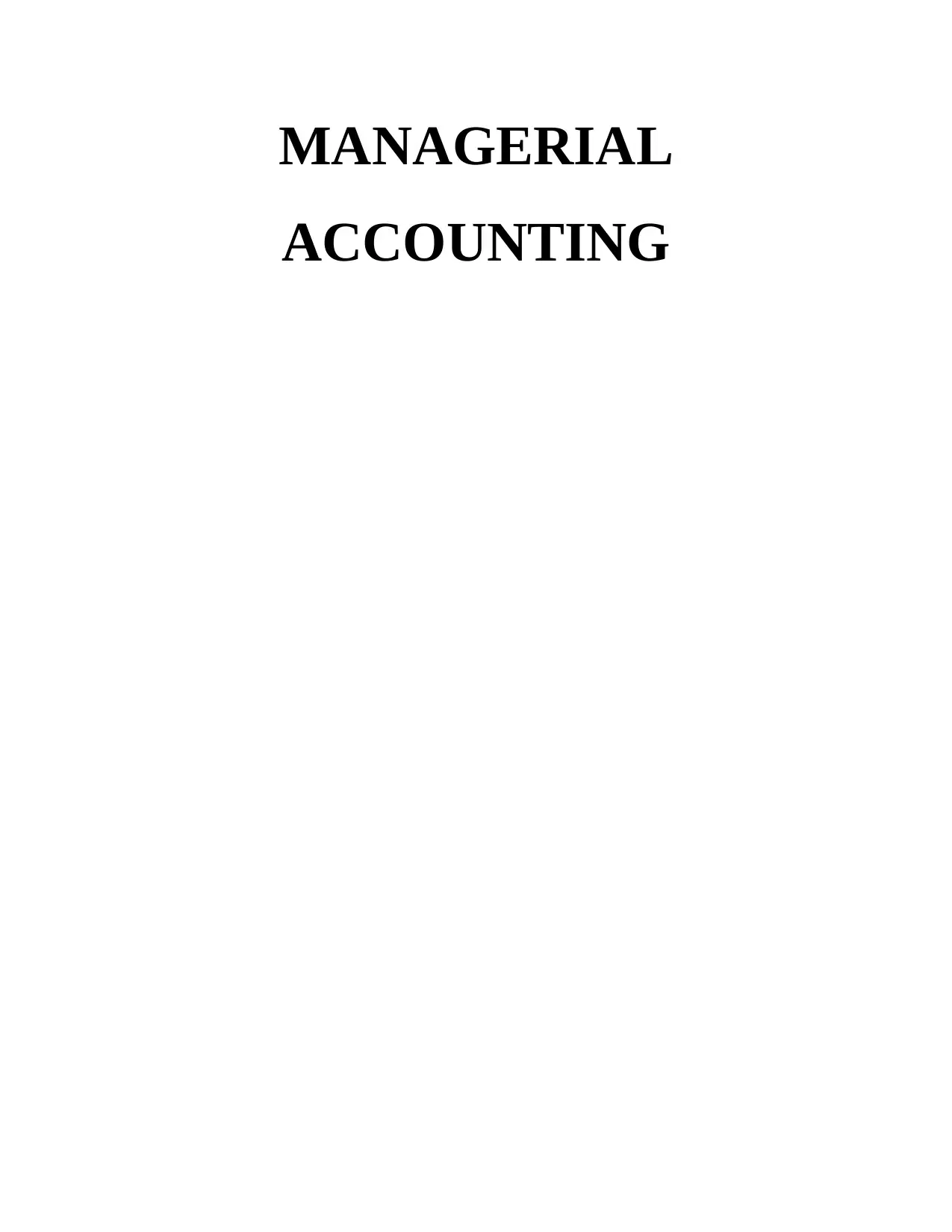
MANAGERIAL
ACCOUNTING
ACCOUNTING
Secure Best Marks with AI Grader
Need help grading? Try our AI Grader for instant feedback on your assignments.
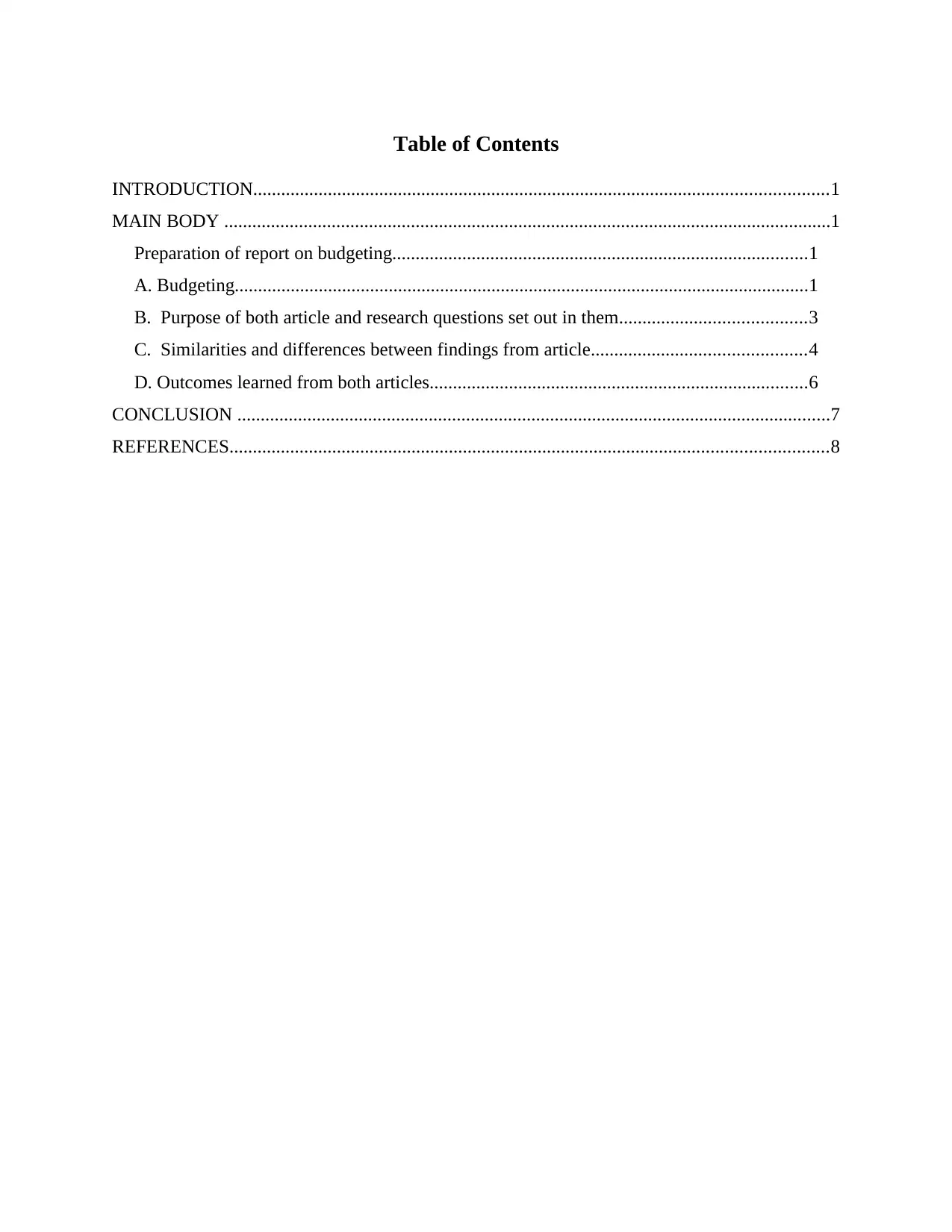
Table of Contents
INTRODUCTION...........................................................................................................................1
MAIN BODY ..................................................................................................................................1
Preparation of report on budgeting.........................................................................................1
A. Budgeting...........................................................................................................................1
B. Purpose of both article and research questions set out in them........................................3
C. Similarities and differences between findings from article..............................................4
D. Outcomes learned from both articles.................................................................................6
CONCLUSION ...............................................................................................................................7
REFERENCES................................................................................................................................8
INTRODUCTION...........................................................................................................................1
MAIN BODY ..................................................................................................................................1
Preparation of report on budgeting.........................................................................................1
A. Budgeting...........................................................................................................................1
B. Purpose of both article and research questions set out in them........................................3
C. Similarities and differences between findings from article..............................................4
D. Outcomes learned from both articles.................................................................................6
CONCLUSION ...............................................................................................................................7
REFERENCES................................................................................................................................8
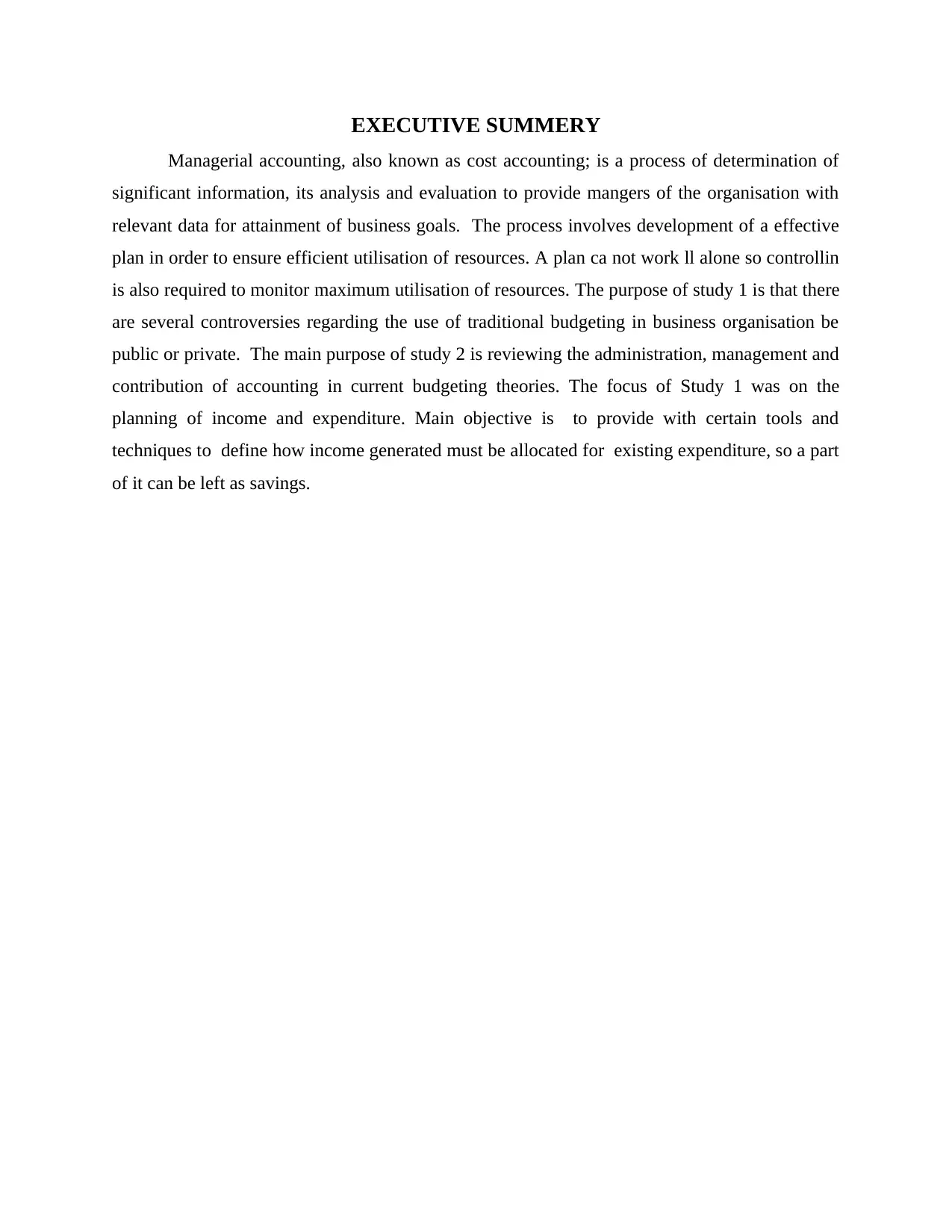
EXECUTIVE SUMMERY
Managerial accounting, also known as cost accounting; is a process of determination of
significant information, its analysis and evaluation to provide mangers of the organisation with
relevant data for attainment of business goals. The process involves development of a effective
plan in order to ensure efficient utilisation of resources. A plan ca not work ll alone so controllin
is also required to monitor maximum utilisation of resources. The purpose of study 1 is that there
are several controversies regarding the use of traditional budgeting in business organisation be
public or private. The main purpose of study 2 is reviewing the administration, management and
contribution of accounting in current budgeting theories. The focus of Study 1 was on the
planning of income and expenditure. Main objective is to provide with certain tools and
techniques to define how income generated must be allocated for existing expenditure, so a part
of it can be left as savings.
Managerial accounting, also known as cost accounting; is a process of determination of
significant information, its analysis and evaluation to provide mangers of the organisation with
relevant data for attainment of business goals. The process involves development of a effective
plan in order to ensure efficient utilisation of resources. A plan ca not work ll alone so controllin
is also required to monitor maximum utilisation of resources. The purpose of study 1 is that there
are several controversies regarding the use of traditional budgeting in business organisation be
public or private. The main purpose of study 2 is reviewing the administration, management and
contribution of accounting in current budgeting theories. The focus of Study 1 was on the
planning of income and expenditure. Main objective is to provide with certain tools and
techniques to define how income generated must be allocated for existing expenditure, so a part
of it can be left as savings.
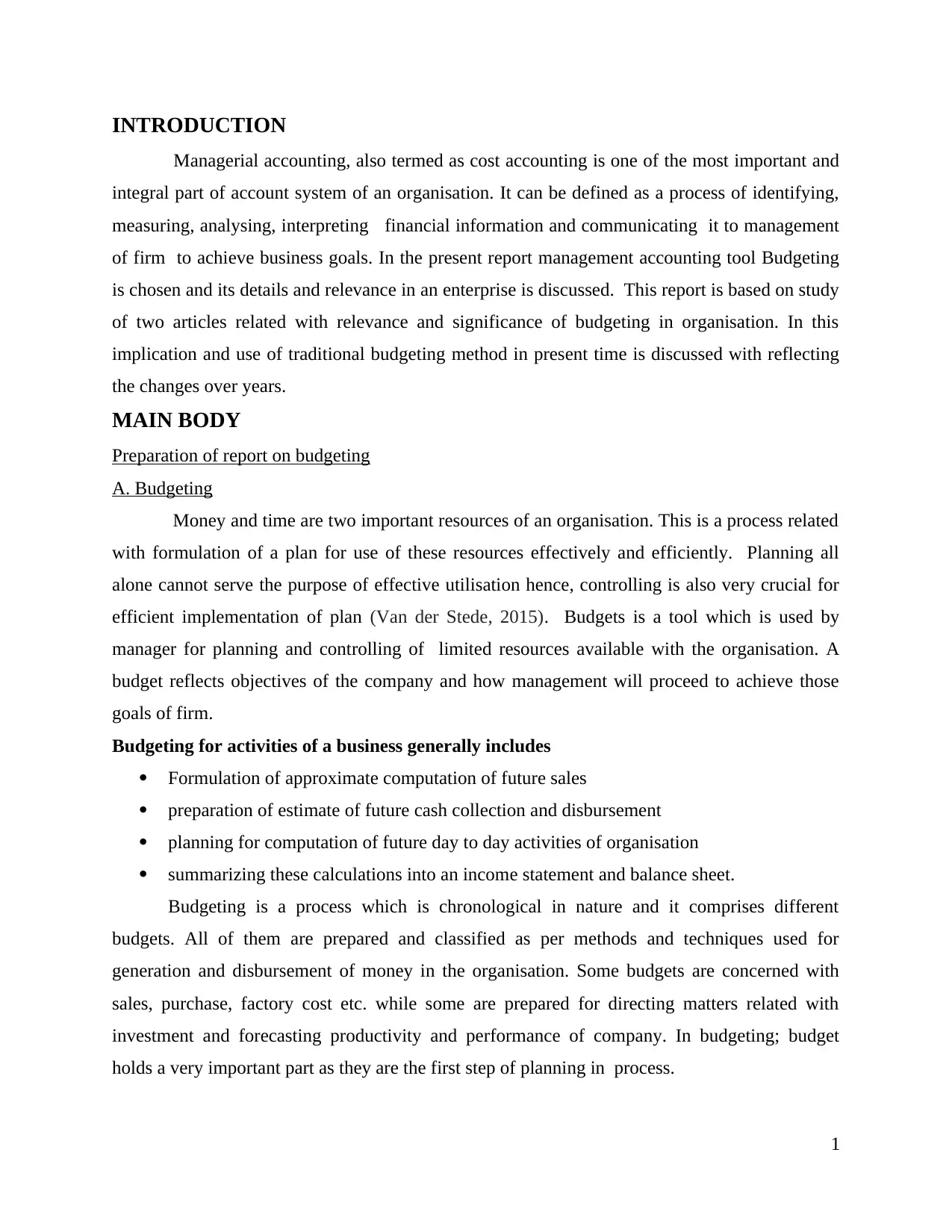
INTRODUCTION
Managerial accounting, also termed as cost accounting is one of the most important and
integral part of account system of an organisation. It can be defined as a process of identifying,
measuring, analysing, interpreting financial information and communicating it to management
of firm to achieve business goals. In the present report management accounting tool Budgeting
is chosen and its details and relevance in an enterprise is discussed. This report is based on study
of two articles related with relevance and significance of budgeting in organisation. In this
implication and use of traditional budgeting method in present time is discussed with reflecting
the changes over years.
MAIN BODY
Preparation of report on budgeting
A. Budgeting
Money and time are two important resources of an organisation. This is a process related
with formulation of a plan for use of these resources effectively and efficiently. Planning all
alone cannot serve the purpose of effective utilisation hence, controlling is also very crucial for
efficient implementation of plan (Van der Stede, 2015). Budgets is a tool which is used by
manager for planning and controlling of limited resources available with the organisation. A
budget reflects objectives of the company and how management will proceed to achieve those
goals of firm.
Budgeting for activities of a business generally includes
Formulation of approximate computation of future sales
preparation of estimate of future cash collection and disbursement
planning for computation of future day to day activities of organisation
summarizing these calculations into an income statement and balance sheet.
Budgeting is a process which is chronological in nature and it comprises different
budgets. All of them are prepared and classified as per methods and techniques used for
generation and disbursement of money in the organisation. Some budgets are concerned with
sales, purchase, factory cost etc. while some are prepared for directing matters related with
investment and forecasting productivity and performance of company. In budgeting; budget
holds a very important part as they are the first step of planning in process.
1
Managerial accounting, also termed as cost accounting is one of the most important and
integral part of account system of an organisation. It can be defined as a process of identifying,
measuring, analysing, interpreting financial information and communicating it to management
of firm to achieve business goals. In the present report management accounting tool Budgeting
is chosen and its details and relevance in an enterprise is discussed. This report is based on study
of two articles related with relevance and significance of budgeting in organisation. In this
implication and use of traditional budgeting method in present time is discussed with reflecting
the changes over years.
MAIN BODY
Preparation of report on budgeting
A. Budgeting
Money and time are two important resources of an organisation. This is a process related
with formulation of a plan for use of these resources effectively and efficiently. Planning all
alone cannot serve the purpose of effective utilisation hence, controlling is also very crucial for
efficient implementation of plan (Van der Stede, 2015). Budgets is a tool which is used by
manager for planning and controlling of limited resources available with the organisation. A
budget reflects objectives of the company and how management will proceed to achieve those
goals of firm.
Budgeting for activities of a business generally includes
Formulation of approximate computation of future sales
preparation of estimate of future cash collection and disbursement
planning for computation of future day to day activities of organisation
summarizing these calculations into an income statement and balance sheet.
Budgeting is a process which is chronological in nature and it comprises different
budgets. All of them are prepared and classified as per methods and techniques used for
generation and disbursement of money in the organisation. Some budgets are concerned with
sales, purchase, factory cost etc. while some are prepared for directing matters related with
investment and forecasting productivity and performance of company. In budgeting; budget
holds a very important part as they are the first step of planning in process.
1
Secure Best Marks with AI Grader
Need help grading? Try our AI Grader for instant feedback on your assignments.
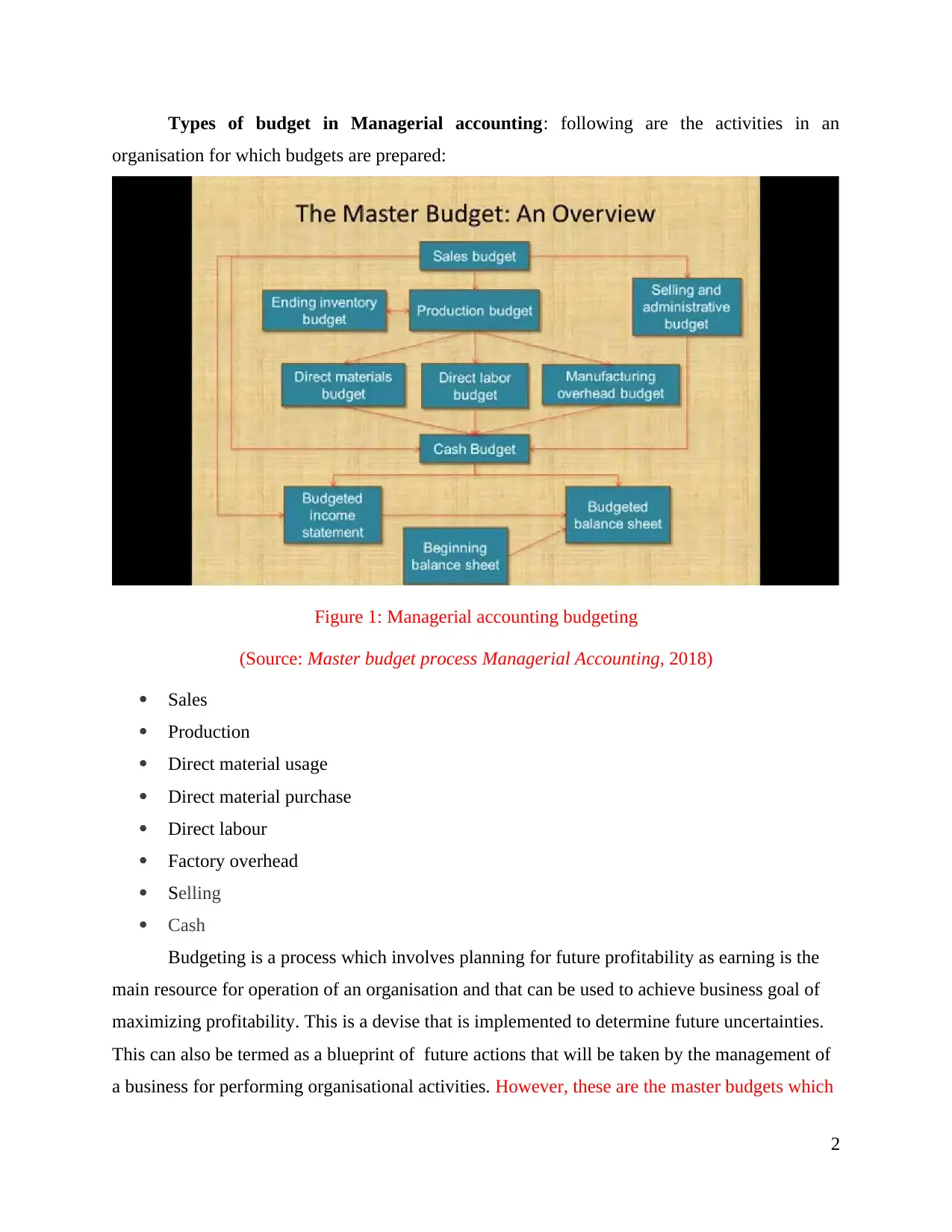
Types of budget in Managerial accounting: following are the activities in an
organisation for which budgets are prepared:
Figure 1: Managerial accounting budgeting
(Source: Master budget process Managerial Accounting, 2018)
Sales
Production
Direct material usage
Direct material purchase
Direct labour
Factory overhead
Selling
Cash
Budgeting is a process which involves planning for future profitability as earning is the
main resource for operation of an organisation and that can be used to achieve business goal of
maximizing profitability. This is a devise that is implemented to determine future uncertainties.
This can also be termed as a blueprint of future actions that will be taken by the management of
a business for performing organisational activities. However, these are the master budgets which
2
organisation for which budgets are prepared:
Figure 1: Managerial accounting budgeting
(Source: Master budget process Managerial Accounting, 2018)
Sales
Production
Direct material usage
Direct material purchase
Direct labour
Factory overhead
Selling
Cash
Budgeting is a process which involves planning for future profitability as earning is the
main resource for operation of an organisation and that can be used to achieve business goal of
maximizing profitability. This is a devise that is implemented to determine future uncertainties.
This can also be termed as a blueprint of future actions that will be taken by the management of
a business for performing organisational activities. However, these are the master budgets which
2
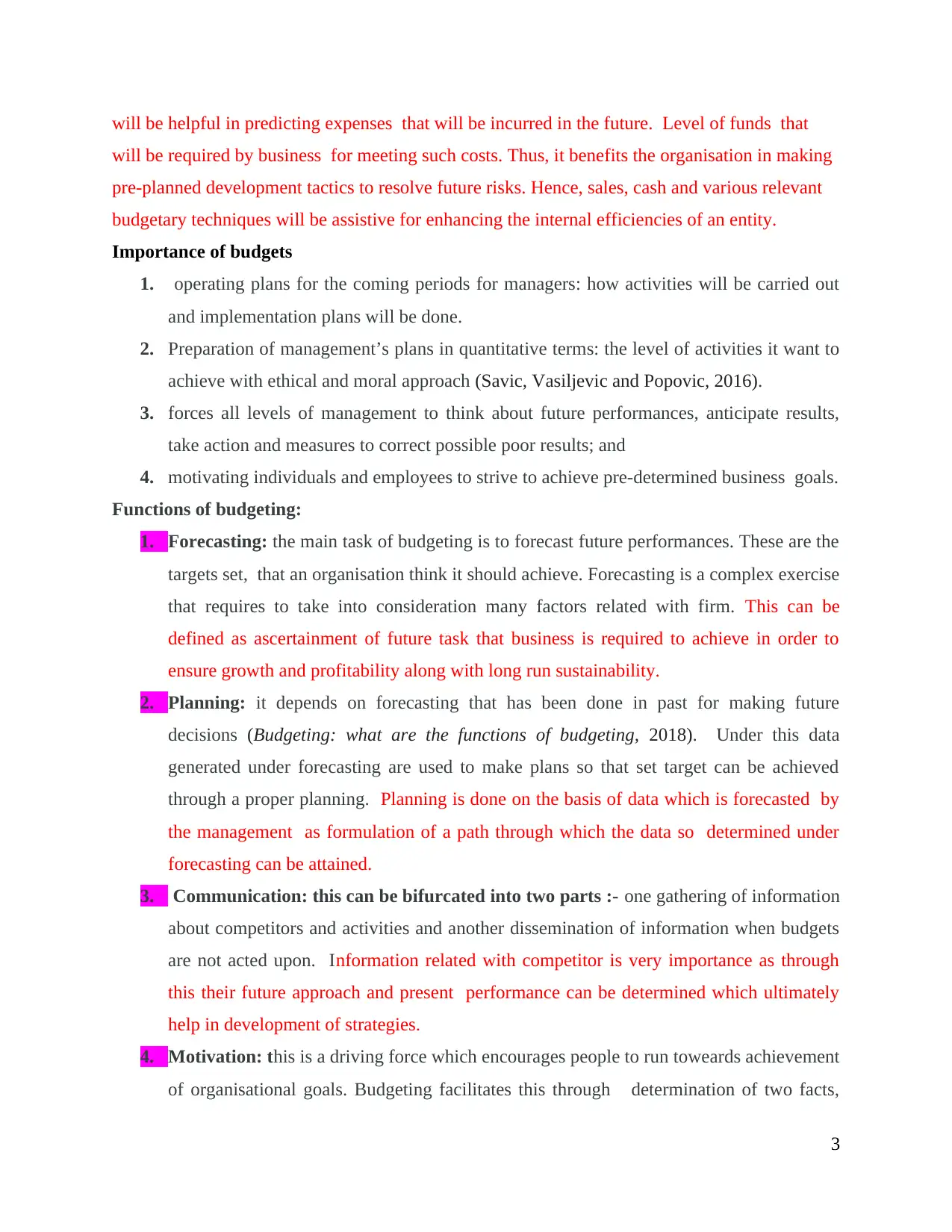
will be helpful in predicting expenses that will be incurred in the future. Level of funds that
will be required by business for meeting such costs. Thus, it benefits the organisation in making
pre-planned development tactics to resolve future risks. Hence, sales, cash and various relevant
budgetary techniques will be assistive for enhancing the internal efficiencies of an entity.
Importance of budgets
1. operating plans for the coming periods for managers: how activities will be carried out
and implementation plans will be done.
2. Preparation of management’s plans in quantitative terms: the level of activities it want to
achieve with ethical and moral approach (Savic, Vasiljevic and Popovic, 2016).
3. forces all levels of management to think about future performances, anticipate results,
take action and measures to correct possible poor results; and
4. motivating individuals and employees to strive to achieve pre-determined business goals.
Functions of budgeting:
1. Forecasting: the main task of budgeting is to forecast future performances. These are the
targets set, that an organisation think it should achieve. Forecasting is a complex exercise
that requires to take into consideration many factors related with firm. This can be
defined as ascertainment of future task that business is required to achieve in order to
ensure growth and profitability along with long run sustainability.
2. Planning: it depends on forecasting that has been done in past for making future
decisions (Budgeting: what are the functions of budgeting, 2018). Under this data
generated under forecasting are used to make plans so that set target can be achieved
through a proper planning. Planning is done on the basis of data which is forecasted by
the management as formulation of a path through which the data so determined under
forecasting can be attained.
3. Communication: this can be bifurcated into two parts :- one gathering of information
about competitors and activities and another dissemination of information when budgets
are not acted upon. Information related with competitor is very importance as through
this their future approach and present performance can be determined which ultimately
help in development of strategies.
4. Motivation: this is a driving force which encourages people to run toweards achievement
of organisational goals. Budgeting facilitates this through determination of two facts,
3
will be required by business for meeting such costs. Thus, it benefits the organisation in making
pre-planned development tactics to resolve future risks. Hence, sales, cash and various relevant
budgetary techniques will be assistive for enhancing the internal efficiencies of an entity.
Importance of budgets
1. operating plans for the coming periods for managers: how activities will be carried out
and implementation plans will be done.
2. Preparation of management’s plans in quantitative terms: the level of activities it want to
achieve with ethical and moral approach (Savic, Vasiljevic and Popovic, 2016).
3. forces all levels of management to think about future performances, anticipate results,
take action and measures to correct possible poor results; and
4. motivating individuals and employees to strive to achieve pre-determined business goals.
Functions of budgeting:
1. Forecasting: the main task of budgeting is to forecast future performances. These are the
targets set, that an organisation think it should achieve. Forecasting is a complex exercise
that requires to take into consideration many factors related with firm. This can be
defined as ascertainment of future task that business is required to achieve in order to
ensure growth and profitability along with long run sustainability.
2. Planning: it depends on forecasting that has been done in past for making future
decisions (Budgeting: what are the functions of budgeting, 2018). Under this data
generated under forecasting are used to make plans so that set target can be achieved
through a proper planning. Planning is done on the basis of data which is forecasted by
the management as formulation of a path through which the data so determined under
forecasting can be attained.
3. Communication: this can be bifurcated into two parts :- one gathering of information
about competitors and activities and another dissemination of information when budgets
are not acted upon. Information related with competitor is very importance as through
this their future approach and present performance can be determined which ultimately
help in development of strategies.
4. Motivation: this is a driving force which encourages people to run toweards achievement
of organisational goals. Budgeting facilitates this through determination of two facts,
3
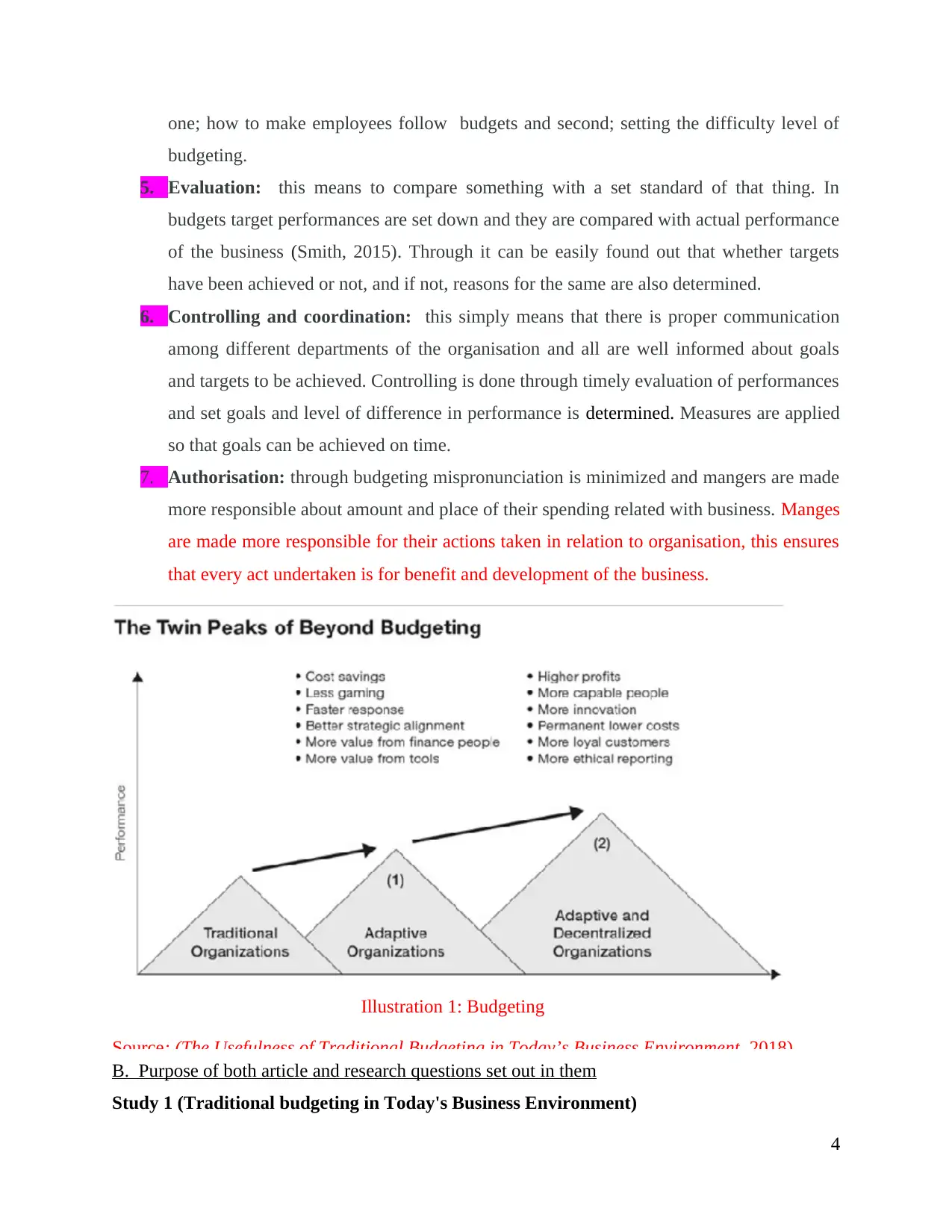
one; how to make employees follow budgets and second; setting the difficulty level of
budgeting.
5. Evaluation: this means to compare something with a set standard of that thing. In
budgets target performances are set down and they are compared with actual performance
of the business (Smith, 2015). Through it can be easily found out that whether targets
have been achieved or not, and if not, reasons for the same are also determined.
6. Controlling and coordination: this simply means that there is proper communication
among different departments of the organisation and all are well informed about goals
and targets to be achieved. Controlling is done through timely evaluation of performances
and set goals and level of difference in performance is determined. Measures are applied
so that goals can be achieved on time.
7. Authorisation: through budgeting mispronunciation is minimized and mangers are made
more responsible about amount and place of their spending related with business. Manges
are made more responsible for their actions taken in relation to organisation, this ensures
that every act undertaken is for benefit and development of the business.
Illustration 1: Budgeting
Source: (The Usefulness of Traditional Budgeting in Today’s Business Environment, 2018)
B. Purpose of both article and research questions set out in them
Study 1 (Traditional budgeting in Today's Business Environment)
4
budgeting.
5. Evaluation: this means to compare something with a set standard of that thing. In
budgets target performances are set down and they are compared with actual performance
of the business (Smith, 2015). Through it can be easily found out that whether targets
have been achieved or not, and if not, reasons for the same are also determined.
6. Controlling and coordination: this simply means that there is proper communication
among different departments of the organisation and all are well informed about goals
and targets to be achieved. Controlling is done through timely evaluation of performances
and set goals and level of difference in performance is determined. Measures are applied
so that goals can be achieved on time.
7. Authorisation: through budgeting mispronunciation is minimized and mangers are made
more responsible about amount and place of their spending related with business. Manges
are made more responsible for their actions taken in relation to organisation, this ensures
that every act undertaken is for benefit and development of the business.
Illustration 1: Budgeting
Source: (The Usefulness of Traditional Budgeting in Today’s Business Environment, 2018)
B. Purpose of both article and research questions set out in them
Study 1 (Traditional budgeting in Today's Business Environment)
4
Paraphrase This Document
Need a fresh take? Get an instant paraphrase of this document with our AI Paraphraser
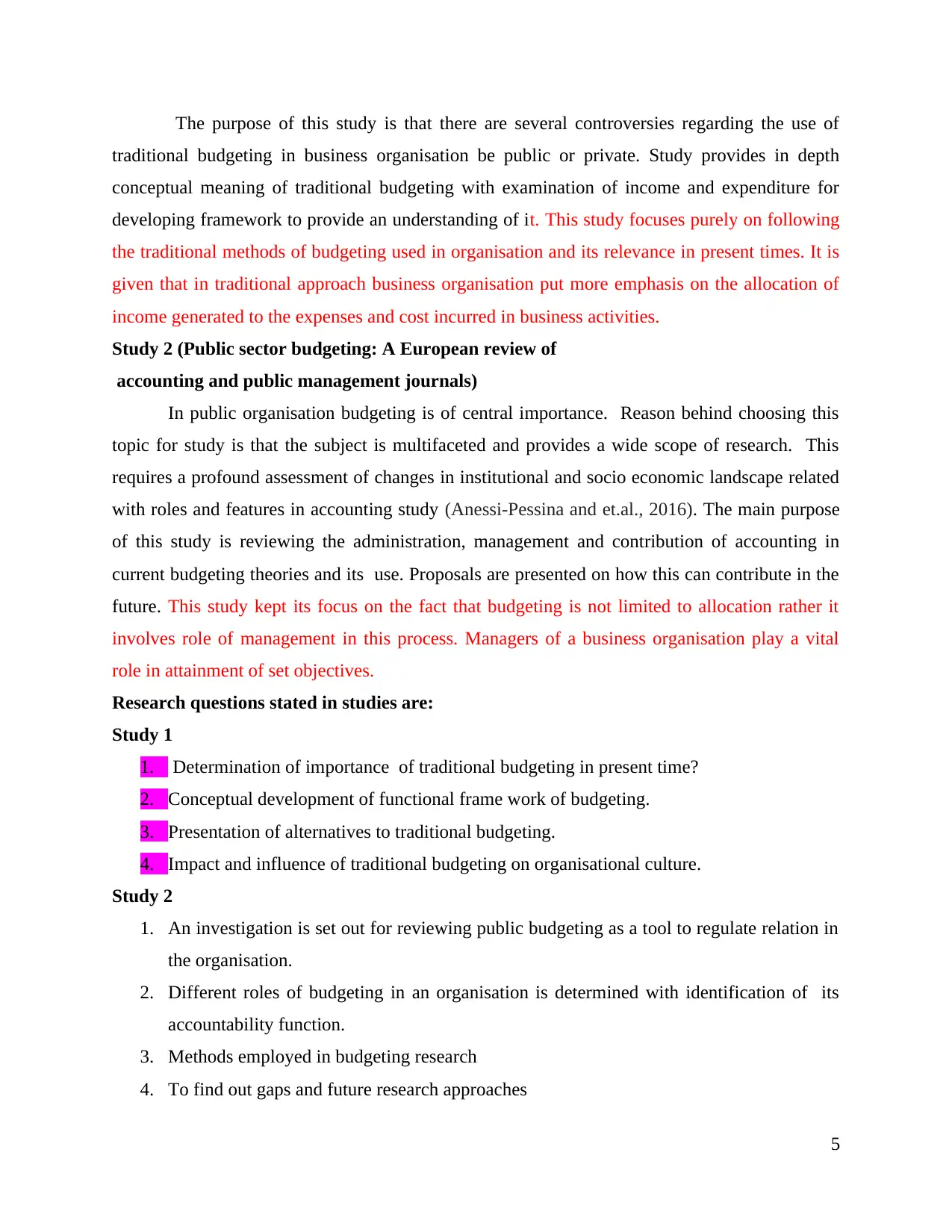
The purpose of this study is that there are several controversies regarding the use of
traditional budgeting in business organisation be public or private. Study provides in depth
conceptual meaning of traditional budgeting with examination of income and expenditure for
developing framework to provide an understanding of it. This study focuses purely on following
the traditional methods of budgeting used in organisation and its relevance in present times. It is
given that in traditional approach business organisation put more emphasis on the allocation of
income generated to the expenses and cost incurred in business activities.
Study 2 (Public sector budgeting: A European review of
accounting and public management journals)
In public organisation budgeting is of central importance. Reason behind choosing this
topic for study is that the subject is multifaceted and provides a wide scope of research. This
requires a profound assessment of changes in institutional and socio economic landscape related
with roles and features in accounting study (Anessi-Pessina and et.al., 2016). The main purpose
of this study is reviewing the administration, management and contribution of accounting in
current budgeting theories and its use. Proposals are presented on how this can contribute in the
future. This study kept its focus on the fact that budgeting is not limited to allocation rather it
involves role of management in this process. Managers of a business organisation play a vital
role in attainment of set objectives.
Research questions stated in studies are:
Study 1
1. Determination of importance of traditional budgeting in present time?
2. Conceptual development of functional frame work of budgeting.
3. Presentation of alternatives to traditional budgeting.
4. Impact and influence of traditional budgeting on organisational culture.
Study 2
1. An investigation is set out for reviewing public budgeting as a tool to regulate relation in
the organisation.
2. Different roles of budgeting in an organisation is determined with identification of its
accountability function.
3. Methods employed in budgeting research
4. To find out gaps and future research approaches
5
traditional budgeting in business organisation be public or private. Study provides in depth
conceptual meaning of traditional budgeting with examination of income and expenditure for
developing framework to provide an understanding of it. This study focuses purely on following
the traditional methods of budgeting used in organisation and its relevance in present times. It is
given that in traditional approach business organisation put more emphasis on the allocation of
income generated to the expenses and cost incurred in business activities.
Study 2 (Public sector budgeting: A European review of
accounting and public management journals)
In public organisation budgeting is of central importance. Reason behind choosing this
topic for study is that the subject is multifaceted and provides a wide scope of research. This
requires a profound assessment of changes in institutional and socio economic landscape related
with roles and features in accounting study (Anessi-Pessina and et.al., 2016). The main purpose
of this study is reviewing the administration, management and contribution of accounting in
current budgeting theories and its use. Proposals are presented on how this can contribute in the
future. This study kept its focus on the fact that budgeting is not limited to allocation rather it
involves role of management in this process. Managers of a business organisation play a vital
role in attainment of set objectives.
Research questions stated in studies are:
Study 1
1. Determination of importance of traditional budgeting in present time?
2. Conceptual development of functional frame work of budgeting.
3. Presentation of alternatives to traditional budgeting.
4. Impact and influence of traditional budgeting on organisational culture.
Study 2
1. An investigation is set out for reviewing public budgeting as a tool to regulate relation in
the organisation.
2. Different roles of budgeting in an organisation is determined with identification of its
accountability function.
3. Methods employed in budgeting research
4. To find out gaps and future research approaches
5
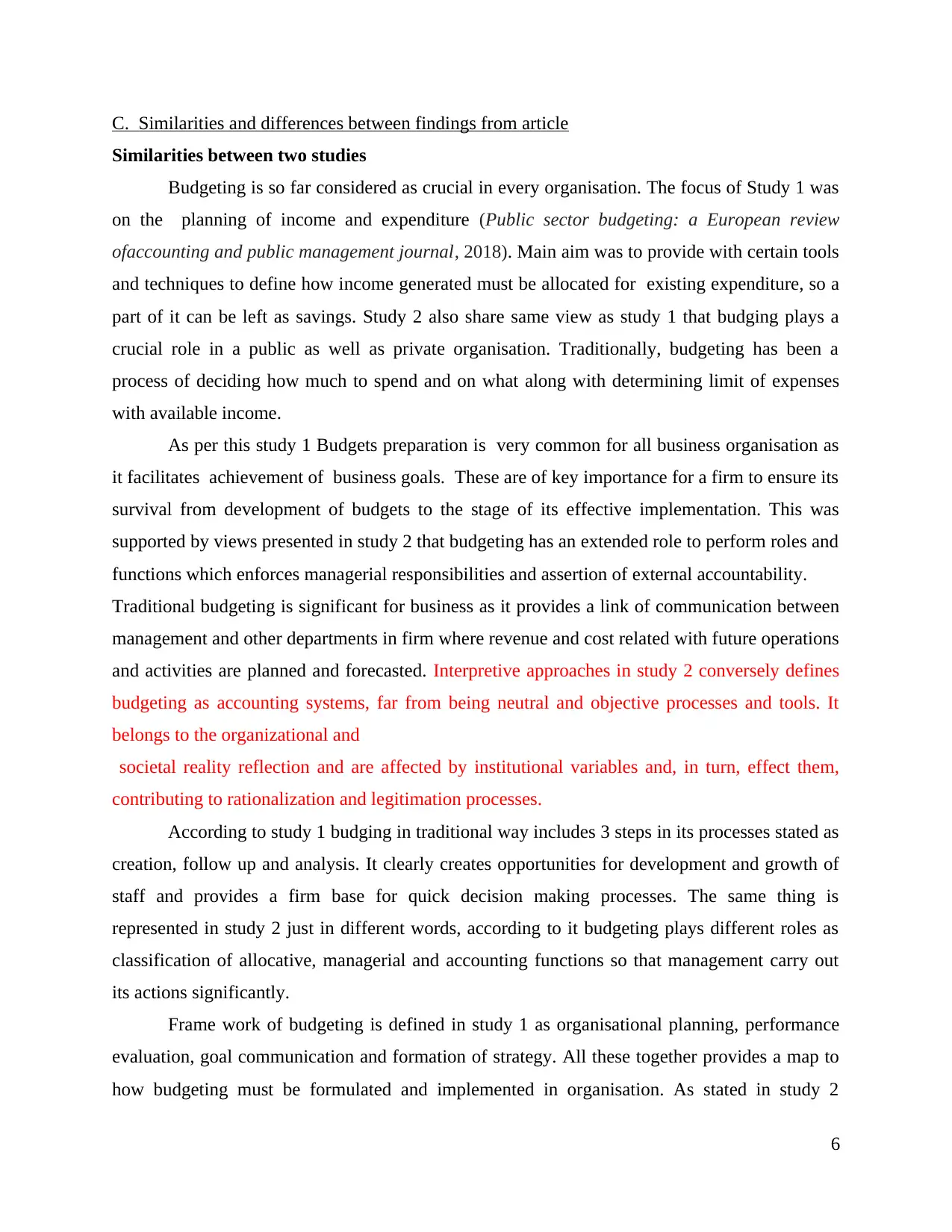
C. Similarities and differences between findings from article
Similarities between two studies
Budgeting is so far considered as crucial in every organisation. The focus of Study 1 was
on the planning of income and expenditure (Public sector budgeting: a European review
ofaccounting and public management journal, 2018). Main aim was to provide with certain tools
and techniques to define how income generated must be allocated for existing expenditure, so a
part of it can be left as savings. Study 2 also share same view as study 1 that budging plays a
crucial role in a public as well as private organisation. Traditionally, budgeting has been a
process of deciding how much to spend and on what along with determining limit of expenses
with available income.
As per this study 1 Budgets preparation is very common for all business organisation as
it facilitates achievement of business goals. These are of key importance for a firm to ensure its
survival from development of budgets to the stage of its effective implementation. This was
supported by views presented in study 2 that budgeting has an extended role to perform roles and
functions which enforces managerial responsibilities and assertion of external accountability.
Traditional budgeting is significant for business as it provides a link of communication between
management and other departments in firm where revenue and cost related with future operations
and activities are planned and forecasted. Interpretive approaches in study 2 conversely defines
budgeting as accounting systems, far from being neutral and objective processes and tools. It
belongs to the organizational and
societal reality reflection and are affected by institutional variables and, in turn, effect them,
contributing to rationalization and legitimation processes.
According to study 1 budging in traditional way includes 3 steps in its processes stated as
creation, follow up and analysis. It clearly creates opportunities for development and growth of
staff and provides a firm base for quick decision making processes. The same thing is
represented in study 2 just in different words, according to it budgeting plays different roles as
classification of allocative, managerial and accounting functions so that management carry out
its actions significantly.
Frame work of budgeting is defined in study 1 as organisational planning, performance
evaluation, goal communication and formation of strategy. All these together provides a map to
how budgeting must be formulated and implemented in organisation. As stated in study 2
6
Similarities between two studies
Budgeting is so far considered as crucial in every organisation. The focus of Study 1 was
on the planning of income and expenditure (Public sector budgeting: a European review
ofaccounting and public management journal, 2018). Main aim was to provide with certain tools
and techniques to define how income generated must be allocated for existing expenditure, so a
part of it can be left as savings. Study 2 also share same view as study 1 that budging plays a
crucial role in a public as well as private organisation. Traditionally, budgeting has been a
process of deciding how much to spend and on what along with determining limit of expenses
with available income.
As per this study 1 Budgets preparation is very common for all business organisation as
it facilitates achievement of business goals. These are of key importance for a firm to ensure its
survival from development of budgets to the stage of its effective implementation. This was
supported by views presented in study 2 that budgeting has an extended role to perform roles and
functions which enforces managerial responsibilities and assertion of external accountability.
Traditional budgeting is significant for business as it provides a link of communication between
management and other departments in firm where revenue and cost related with future operations
and activities are planned and forecasted. Interpretive approaches in study 2 conversely defines
budgeting as accounting systems, far from being neutral and objective processes and tools. It
belongs to the organizational and
societal reality reflection and are affected by institutional variables and, in turn, effect them,
contributing to rationalization and legitimation processes.
According to study 1 budging in traditional way includes 3 steps in its processes stated as
creation, follow up and analysis. It clearly creates opportunities for development and growth of
staff and provides a firm base for quick decision making processes. The same thing is
represented in study 2 just in different words, according to it budgeting plays different roles as
classification of allocative, managerial and accounting functions so that management carry out
its actions significantly.
Frame work of budgeting is defined in study 1 as organisational planning, performance
evaluation, goal communication and formation of strategy. All these together provides a map to
how budgeting must be formulated and implemented in organisation. As stated in study 2
6
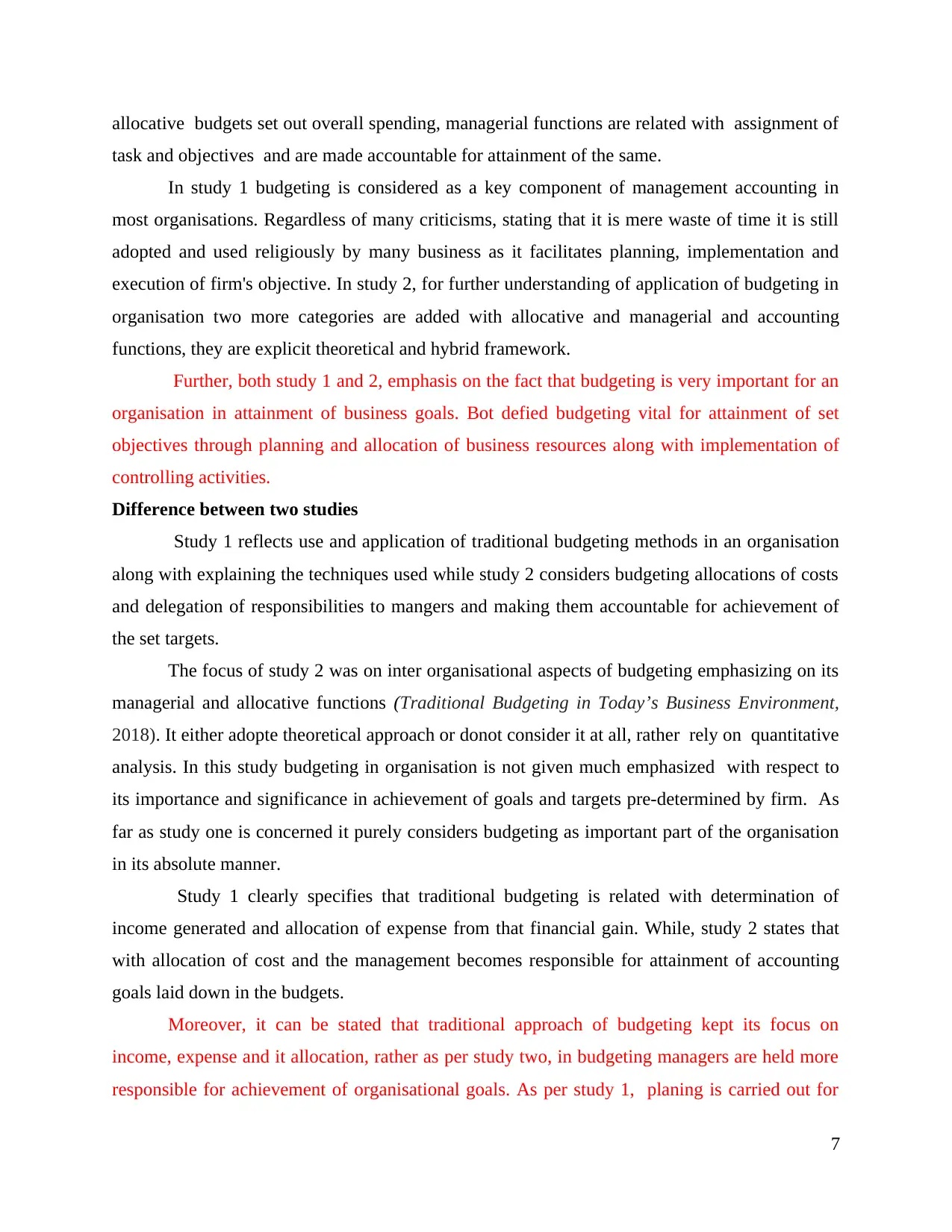
allocative budgets set out overall spending, managerial functions are related with assignment of
task and objectives and are made accountable for attainment of the same.
In study 1 budgeting is considered as a key component of management accounting in
most organisations. Regardless of many criticisms, stating that it is mere waste of time it is still
adopted and used religiously by many business as it facilitates planning, implementation and
execution of firm's objective. In study 2, for further understanding of application of budgeting in
organisation two more categories are added with allocative and managerial and accounting
functions, they are explicit theoretical and hybrid framework.
Further, both study 1 and 2, emphasis on the fact that budgeting is very important for an
organisation in attainment of business goals. Bot defied budgeting vital for attainment of set
objectives through planning and allocation of business resources along with implementation of
controlling activities.
Difference between two studies
Study 1 reflects use and application of traditional budgeting methods in an organisation
along with explaining the techniques used while study 2 considers budgeting allocations of costs
and delegation of responsibilities to mangers and making them accountable for achievement of
the set targets.
The focus of study 2 was on inter organisational aspects of budgeting emphasizing on its
managerial and allocative functions (Traditional Budgeting in Today’s Business Environment,
2018). It either adopte theoretical approach or donot consider it at all, rather rely on quantitative
analysis. In this study budgeting in organisation is not given much emphasized with respect to
its importance and significance in achievement of goals and targets pre-determined by firm. As
far as study one is concerned it purely considers budgeting as important part of the organisation
in its absolute manner.
Study 1 clearly specifies that traditional budgeting is related with determination of
income generated and allocation of expense from that financial gain. While, study 2 states that
with allocation of cost and the management becomes responsible for attainment of accounting
goals laid down in the budgets.
Moreover, it can be stated that traditional approach of budgeting kept its focus on
income, expense and it allocation, rather as per study two, in budgeting managers are held more
responsible for achievement of organisational goals. As per study 1, planing is carried out for
7
task and objectives and are made accountable for attainment of the same.
In study 1 budgeting is considered as a key component of management accounting in
most organisations. Regardless of many criticisms, stating that it is mere waste of time it is still
adopted and used religiously by many business as it facilitates planning, implementation and
execution of firm's objective. In study 2, for further understanding of application of budgeting in
organisation two more categories are added with allocative and managerial and accounting
functions, they are explicit theoretical and hybrid framework.
Further, both study 1 and 2, emphasis on the fact that budgeting is very important for an
organisation in attainment of business goals. Bot defied budgeting vital for attainment of set
objectives through planning and allocation of business resources along with implementation of
controlling activities.
Difference between two studies
Study 1 reflects use and application of traditional budgeting methods in an organisation
along with explaining the techniques used while study 2 considers budgeting allocations of costs
and delegation of responsibilities to mangers and making them accountable for achievement of
the set targets.
The focus of study 2 was on inter organisational aspects of budgeting emphasizing on its
managerial and allocative functions (Traditional Budgeting in Today’s Business Environment,
2018). It either adopte theoretical approach or donot consider it at all, rather rely on quantitative
analysis. In this study budgeting in organisation is not given much emphasized with respect to
its importance and significance in achievement of goals and targets pre-determined by firm. As
far as study one is concerned it purely considers budgeting as important part of the organisation
in its absolute manner.
Study 1 clearly specifies that traditional budgeting is related with determination of
income generated and allocation of expense from that financial gain. While, study 2 states that
with allocation of cost and the management becomes responsible for attainment of accounting
goals laid down in the budgets.
Moreover, it can be stated that traditional approach of budgeting kept its focus on
income, expense and it allocation, rather as per study two, in budgeting managers are held more
responsible for achievement of organisational goals. As per study 1, planing is carried out for
7
Secure Best Marks with AI Grader
Need help grading? Try our AI Grader for instant feedback on your assignments.
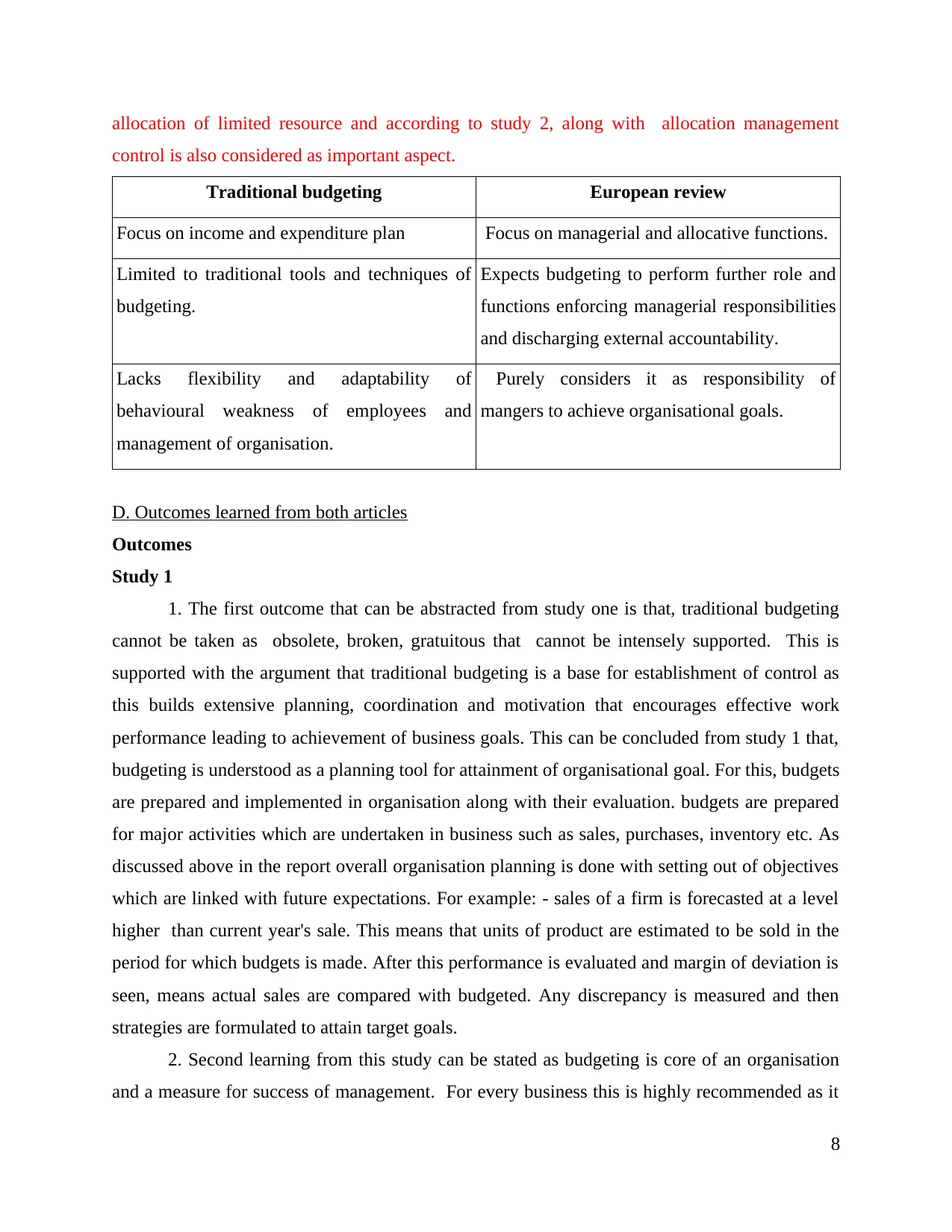
allocation of limited resource and according to study 2, along with allocation management
control is also considered as important aspect.
Traditional budgeting European review
Focus on income and expenditure plan Focus on managerial and allocative functions.
Limited to traditional tools and techniques of
budgeting.
Expects budgeting to perform further role and
functions enforcing managerial responsibilities
and discharging external accountability.
Lacks flexibility and adaptability of
behavioural weakness of employees and
management of organisation.
Purely considers it as responsibility of
mangers to achieve organisational goals.
D. Outcomes learned from both articles
Outcomes
Study 1
1. The first outcome that can be abstracted from study one is that, traditional budgeting
cannot be taken as obsolete, broken, gratuitous that cannot be intensely supported. This is
supported with the argument that traditional budgeting is a base for establishment of control as
this builds extensive planning, coordination and motivation that encourages effective work
performance leading to achievement of business goals. This can be concluded from study 1 that,
budgeting is understood as a planning tool for attainment of organisational goal. For this, budgets
are prepared and implemented in organisation along with their evaluation. budgets are prepared
for major activities which are undertaken in business such as sales, purchases, inventory etc. As
discussed above in the report overall organisation planning is done with setting out of objectives
which are linked with future expectations. For example: - sales of a firm is forecasted at a level
higher than current year's sale. This means that units of product are estimated to be sold in the
period for which budgets is made. After this performance is evaluated and margin of deviation is
seen, means actual sales are compared with budgeted. Any discrepancy is measured and then
strategies are formulated to attain target goals.
2. Second learning from this study can be stated as budgeting is core of an organisation
and a measure for success of management. For every business this is highly recommended as it
8
control is also considered as important aspect.
Traditional budgeting European review
Focus on income and expenditure plan Focus on managerial and allocative functions.
Limited to traditional tools and techniques of
budgeting.
Expects budgeting to perform further role and
functions enforcing managerial responsibilities
and discharging external accountability.
Lacks flexibility and adaptability of
behavioural weakness of employees and
management of organisation.
Purely considers it as responsibility of
mangers to achieve organisational goals.
D. Outcomes learned from both articles
Outcomes
Study 1
1. The first outcome that can be abstracted from study one is that, traditional budgeting
cannot be taken as obsolete, broken, gratuitous that cannot be intensely supported. This is
supported with the argument that traditional budgeting is a base for establishment of control as
this builds extensive planning, coordination and motivation that encourages effective work
performance leading to achievement of business goals. This can be concluded from study 1 that,
budgeting is understood as a planning tool for attainment of organisational goal. For this, budgets
are prepared and implemented in organisation along with their evaluation. budgets are prepared
for major activities which are undertaken in business such as sales, purchases, inventory etc. As
discussed above in the report overall organisation planning is done with setting out of objectives
which are linked with future expectations. For example: - sales of a firm is forecasted at a level
higher than current year's sale. This means that units of product are estimated to be sold in the
period for which budgets is made. After this performance is evaluated and margin of deviation is
seen, means actual sales are compared with budgeted. Any discrepancy is measured and then
strategies are formulated to attain target goals.
2. Second learning from this study can be stated as budgeting is core of an organisation
and a measure for success of management. For every business this is highly recommended as it
8
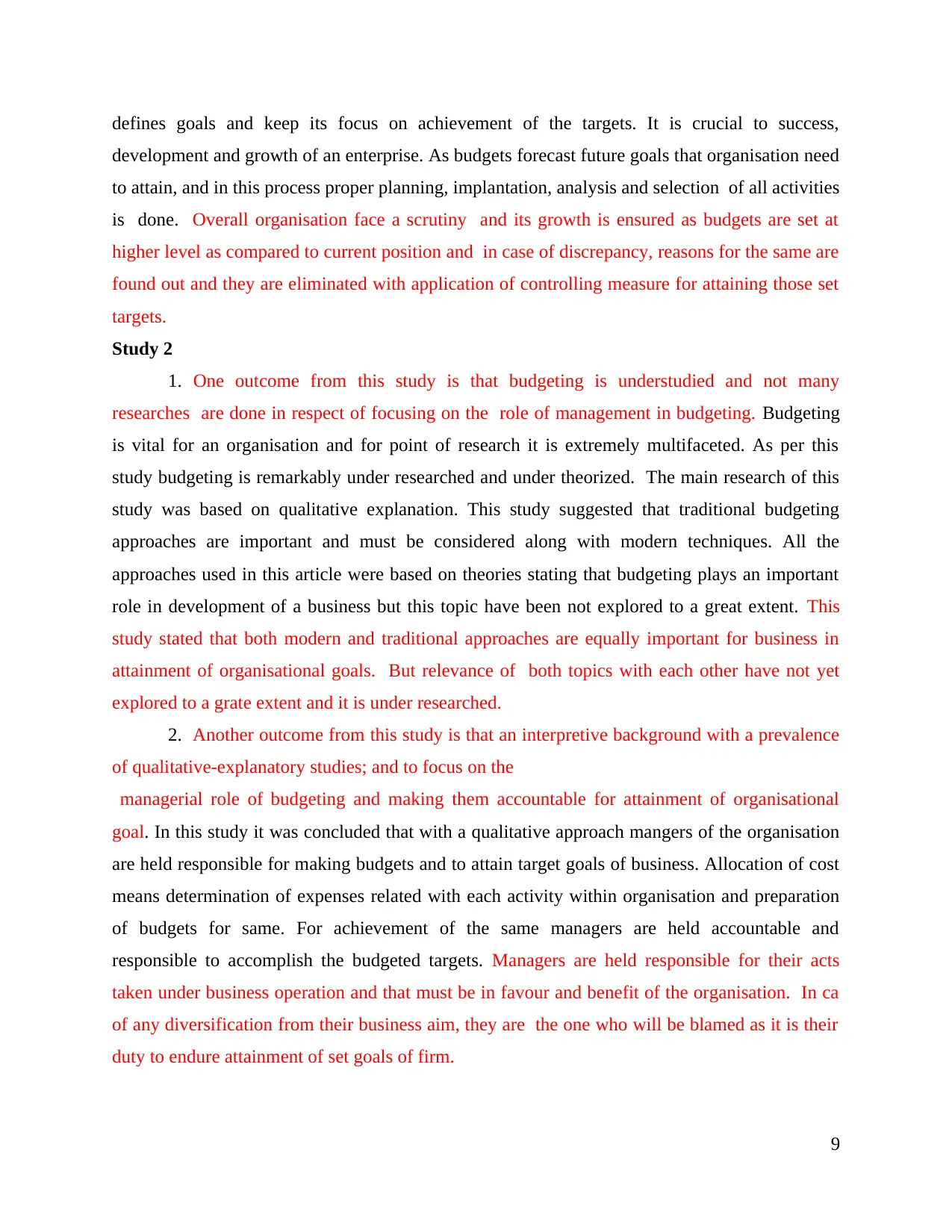
defines goals and keep its focus on achievement of the targets. It is crucial to success,
development and growth of an enterprise. As budgets forecast future goals that organisation need
to attain, and in this process proper planning, implantation, analysis and selection of all activities
is done. Overall organisation face a scrutiny and its growth is ensured as budgets are set at
higher level as compared to current position and in case of discrepancy, reasons for the same are
found out and they are eliminated with application of controlling measure for attaining those set
targets.
Study 2
1. One outcome from this study is that budgeting is understudied and not many
researches are done in respect of focusing on the role of management in budgeting. Budgeting
is vital for an organisation and for point of research it is extremely multifaceted. As per this
study budgeting is remarkably under researched and under theorized. The main research of this
study was based on qualitative explanation. This study suggested that traditional budgeting
approaches are important and must be considered along with modern techniques. All the
approaches used in this article were based on theories stating that budgeting plays an important
role in development of a business but this topic have been not explored to a great extent. This
study stated that both modern and traditional approaches are equally important for business in
attainment of organisational goals. But relevance of both topics with each other have not yet
explored to a grate extent and it is under researched.
2. Another outcome from this study is that an interpretive background with a prevalence
of qualitative-explanatory studies; and to focus on the
managerial role of budgeting and making them accountable for attainment of organisational
goal. In this study it was concluded that with a qualitative approach mangers of the organisation
are held responsible for making budgets and to attain target goals of business. Allocation of cost
means determination of expenses related with each activity within organisation and preparation
of budgets for same. For achievement of the same managers are held accountable and
responsible to accomplish the budgeted targets. Managers are held responsible for their acts
taken under business operation and that must be in favour and benefit of the organisation. In ca
of any diversification from their business aim, they are the one who will be blamed as it is their
duty to endure attainment of set goals of firm.
9
development and growth of an enterprise. As budgets forecast future goals that organisation need
to attain, and in this process proper planning, implantation, analysis and selection of all activities
is done. Overall organisation face a scrutiny and its growth is ensured as budgets are set at
higher level as compared to current position and in case of discrepancy, reasons for the same are
found out and they are eliminated with application of controlling measure for attaining those set
targets.
Study 2
1. One outcome from this study is that budgeting is understudied and not many
researches are done in respect of focusing on the role of management in budgeting. Budgeting
is vital for an organisation and for point of research it is extremely multifaceted. As per this
study budgeting is remarkably under researched and under theorized. The main research of this
study was based on qualitative explanation. This study suggested that traditional budgeting
approaches are important and must be considered along with modern techniques. All the
approaches used in this article were based on theories stating that budgeting plays an important
role in development of a business but this topic have been not explored to a great extent. This
study stated that both modern and traditional approaches are equally important for business in
attainment of organisational goals. But relevance of both topics with each other have not yet
explored to a grate extent and it is under researched.
2. Another outcome from this study is that an interpretive background with a prevalence
of qualitative-explanatory studies; and to focus on the
managerial role of budgeting and making them accountable for attainment of organisational
goal. In this study it was concluded that with a qualitative approach mangers of the organisation
are held responsible for making budgets and to attain target goals of business. Allocation of cost
means determination of expenses related with each activity within organisation and preparation
of budgets for same. For achievement of the same managers are held accountable and
responsible to accomplish the budgeted targets. Managers are held responsible for their acts
taken under business operation and that must be in favour and benefit of the organisation. In ca
of any diversification from their business aim, they are the one who will be blamed as it is their
duty to endure attainment of set goals of firm.
9
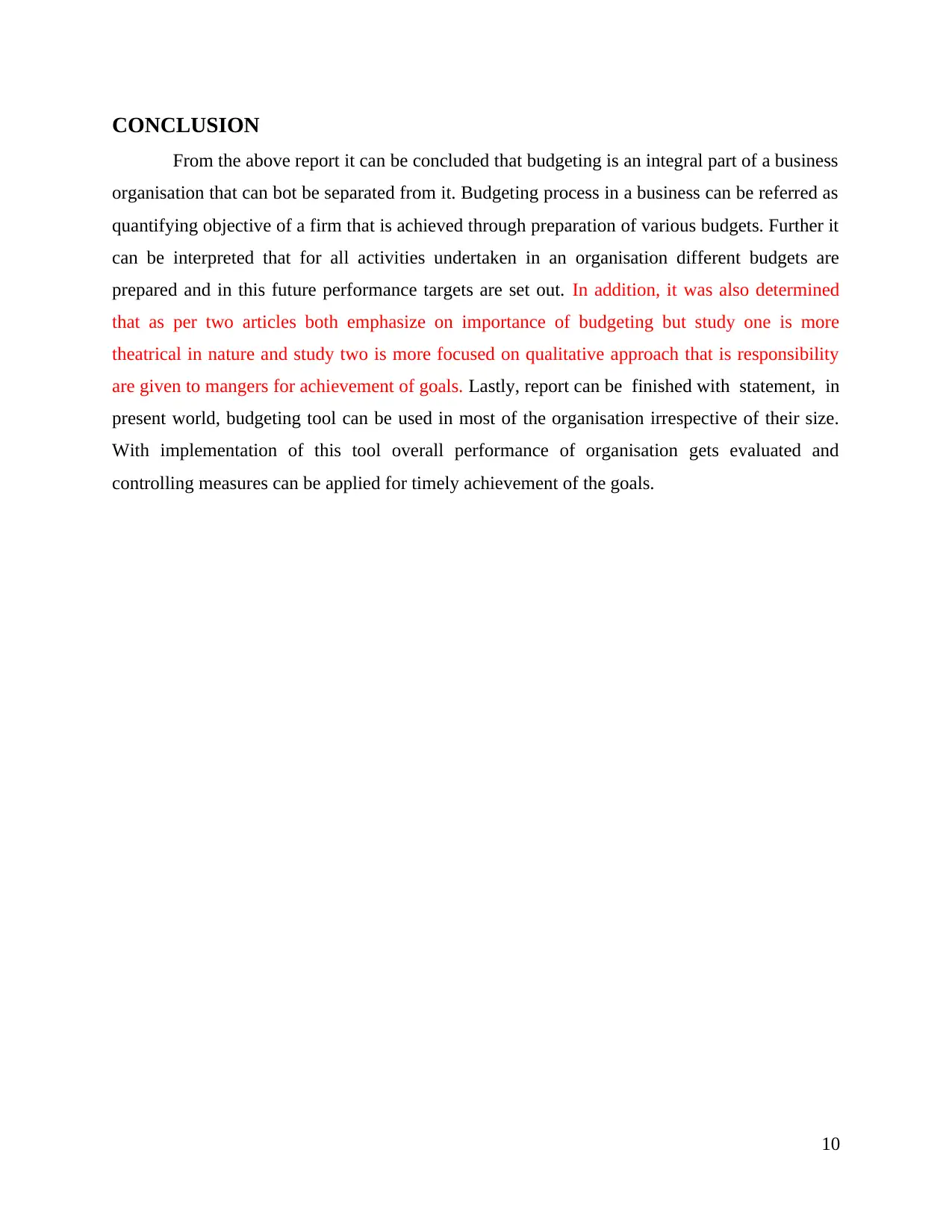
CONCLUSION
From the above report it can be concluded that budgeting is an integral part of a business
organisation that can bot be separated from it. Budgeting process in a business can be referred as
quantifying objective of a firm that is achieved through preparation of various budgets. Further it
can be interpreted that for all activities undertaken in an organisation different budgets are
prepared and in this future performance targets are set out. In addition, it was also determined
that as per two articles both emphasize on importance of budgeting but study one is more
theatrical in nature and study two is more focused on qualitative approach that is responsibility
are given to mangers for achievement of goals. Lastly, report can be finished with statement, in
present world, budgeting tool can be used in most of the organisation irrespective of their size.
With implementation of this tool overall performance of organisation gets evaluated and
controlling measures can be applied for timely achievement of the goals.
10
From the above report it can be concluded that budgeting is an integral part of a business
organisation that can bot be separated from it. Budgeting process in a business can be referred as
quantifying objective of a firm that is achieved through preparation of various budgets. Further it
can be interpreted that for all activities undertaken in an organisation different budgets are
prepared and in this future performance targets are set out. In addition, it was also determined
that as per two articles both emphasize on importance of budgeting but study one is more
theatrical in nature and study two is more focused on qualitative approach that is responsibility
are given to mangers for achievement of goals. Lastly, report can be finished with statement, in
present world, budgeting tool can be used in most of the organisation irrespective of their size.
With implementation of this tool overall performance of organisation gets evaluated and
controlling measures can be applied for timely achievement of the goals.
10
Paraphrase This Document
Need a fresh take? Get an instant paraphrase of this document with our AI Paraphraser
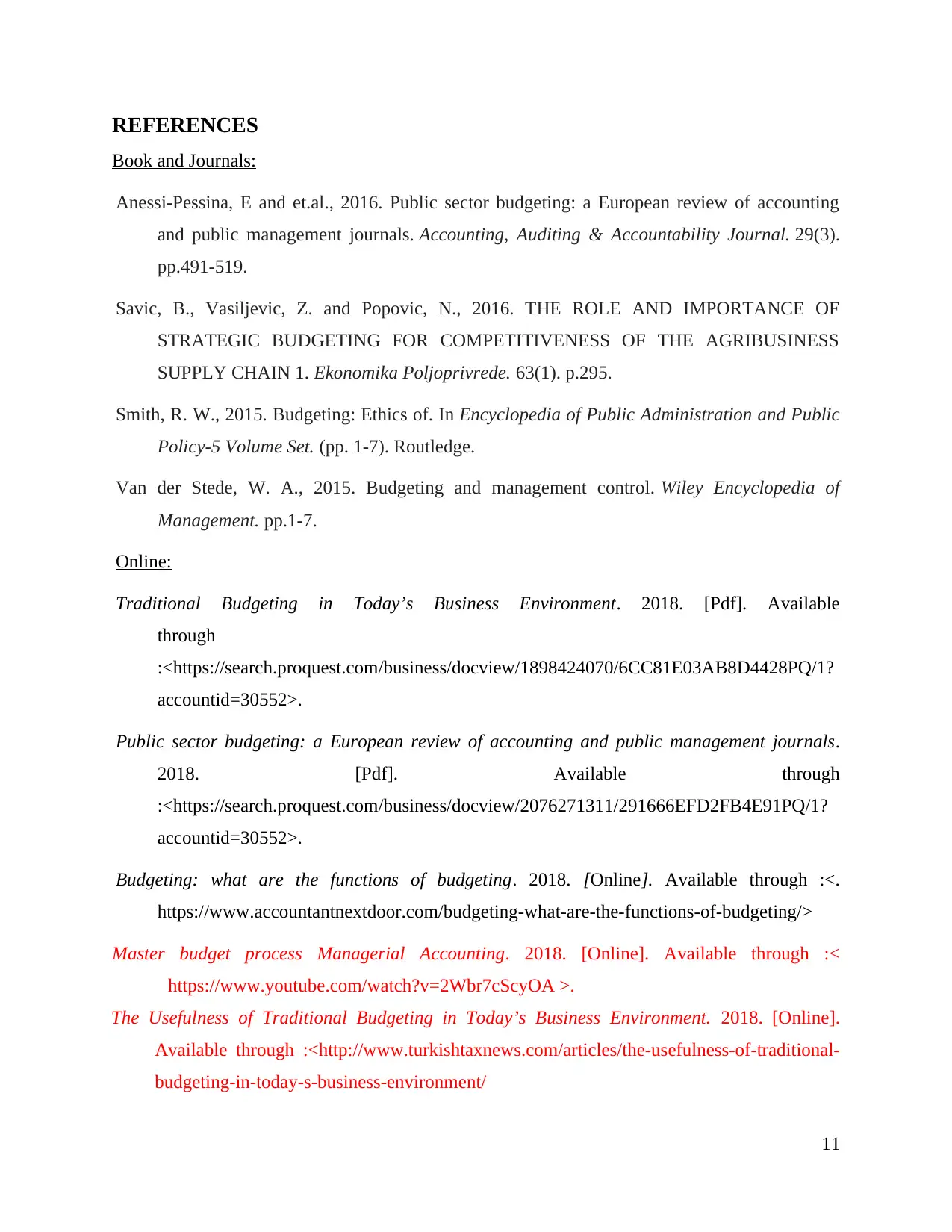
REFERENCES
Book and Journals:
Anessi-Pessina, E and et.al., 2016. Public sector budgeting: a European review of accounting
and public management journals. Accounting, Auditing & Accountability Journal. 29(3).
pp.491-519.
Savic, B., Vasiljevic, Z. and Popovic, N., 2016. THE ROLE AND IMPORTANCE OF
STRATEGIC BUDGETING FOR COMPETITIVENESS OF THE AGRIBUSINESS
SUPPLY CHAIN 1. Ekonomika Poljoprivrede. 63(1). p.295.
Smith, R. W., 2015. Budgeting: Ethics of. In Encyclopedia of Public Administration and Public
Policy-5 Volume Set. (pp. 1-7). Routledge.
Van der Stede, W. A., 2015. Budgeting and management control. Wiley Encyclopedia of
Management. pp.1-7.
Online:
Traditional Budgeting in Today’s Business Environment. 2018. [Pdf]. Available
through
:<https://search.proquest.com/business/docview/1898424070/6CC81E03AB8D4428PQ/1?
accountid=30552>.
Public sector budgeting: a European review of accounting and public management journals.
2018. [Pdf]. Available through
:<https://search.proquest.com/business/docview/2076271311/291666EFD2FB4E91PQ/1?
accountid=30552>.
Budgeting: what are the functions of budgeting. 2018. [Online]. Available through :<.
https://www.accountantnextdoor.com/budgeting-what-are-the-functions-of-budgeting/>
Master budget process Managerial Accounting. 2018. [Online]. Available through :<
https://www.youtube.com/watch?v=2Wbr7cScyOA >.
The Usefulness of Traditional Budgeting in Today’s Business Environment. 2018. [Online].
Available through :<http://www.turkishtaxnews.com/articles/the-usefulness-of-traditional-
budgeting-in-today-s-business-environment/
11
Book and Journals:
Anessi-Pessina, E and et.al., 2016. Public sector budgeting: a European review of accounting
and public management journals. Accounting, Auditing & Accountability Journal. 29(3).
pp.491-519.
Savic, B., Vasiljevic, Z. and Popovic, N., 2016. THE ROLE AND IMPORTANCE OF
STRATEGIC BUDGETING FOR COMPETITIVENESS OF THE AGRIBUSINESS
SUPPLY CHAIN 1. Ekonomika Poljoprivrede. 63(1). p.295.
Smith, R. W., 2015. Budgeting: Ethics of. In Encyclopedia of Public Administration and Public
Policy-5 Volume Set. (pp. 1-7). Routledge.
Van der Stede, W. A., 2015. Budgeting and management control. Wiley Encyclopedia of
Management. pp.1-7.
Online:
Traditional Budgeting in Today’s Business Environment. 2018. [Pdf]. Available
through
:<https://search.proquest.com/business/docview/1898424070/6CC81E03AB8D4428PQ/1?
accountid=30552>.
Public sector budgeting: a European review of accounting and public management journals.
2018. [Pdf]. Available through
:<https://search.proquest.com/business/docview/2076271311/291666EFD2FB4E91PQ/1?
accountid=30552>.
Budgeting: what are the functions of budgeting. 2018. [Online]. Available through :<.
https://www.accountantnextdoor.com/budgeting-what-are-the-functions-of-budgeting/>
Master budget process Managerial Accounting. 2018. [Online]. Available through :<
https://www.youtube.com/watch?v=2Wbr7cScyOA >.
The Usefulness of Traditional Budgeting in Today’s Business Environment. 2018. [Online].
Available through :<http://www.turkishtaxnews.com/articles/the-usefulness-of-traditional-
budgeting-in-today-s-business-environment/
11

12
1 out of 15
Related Documents
Your All-in-One AI-Powered Toolkit for Academic Success.
+13062052269
info@desklib.com
Available 24*7 on WhatsApp / Email
![[object Object]](/_next/static/media/star-bottom.7253800d.svg)
Unlock your academic potential
© 2024 | Zucol Services PVT LTD | All rights reserved.





